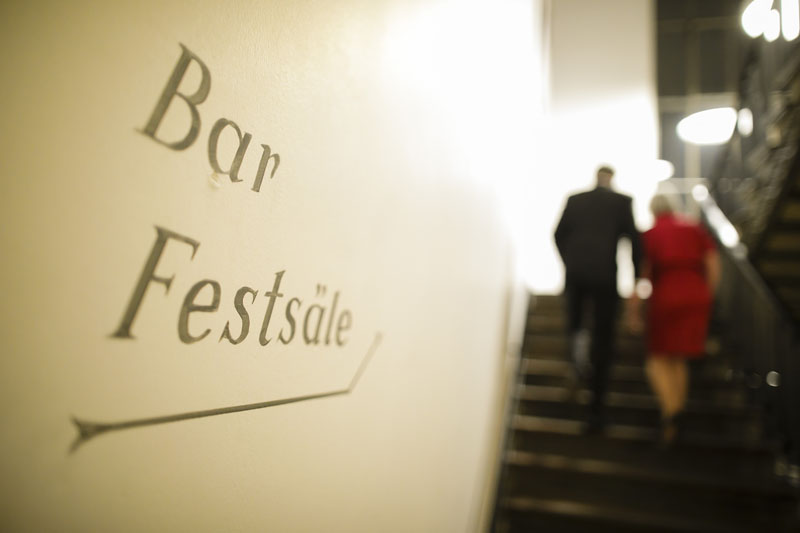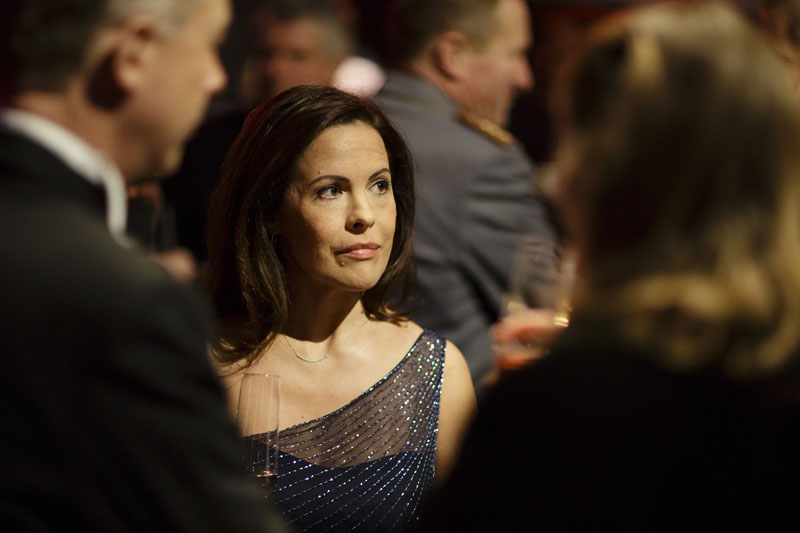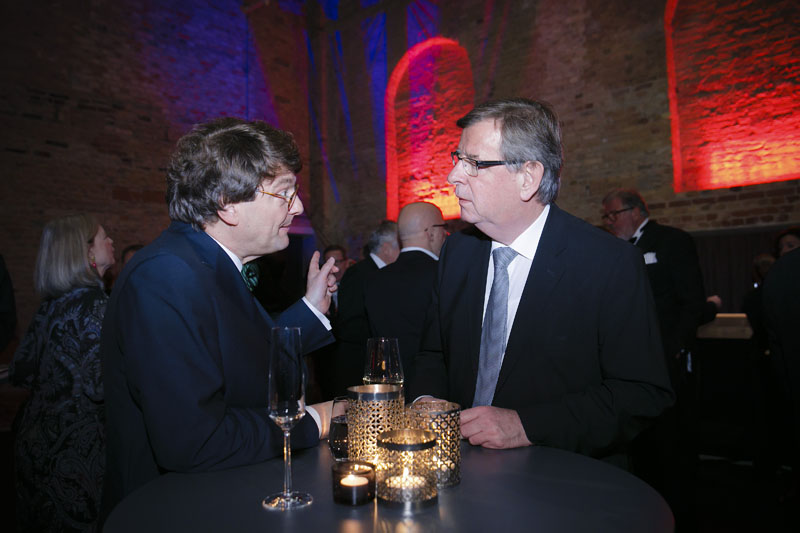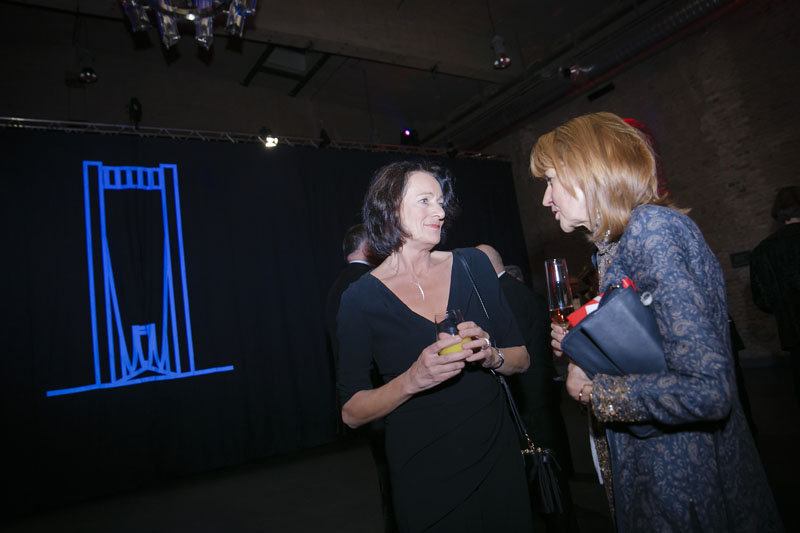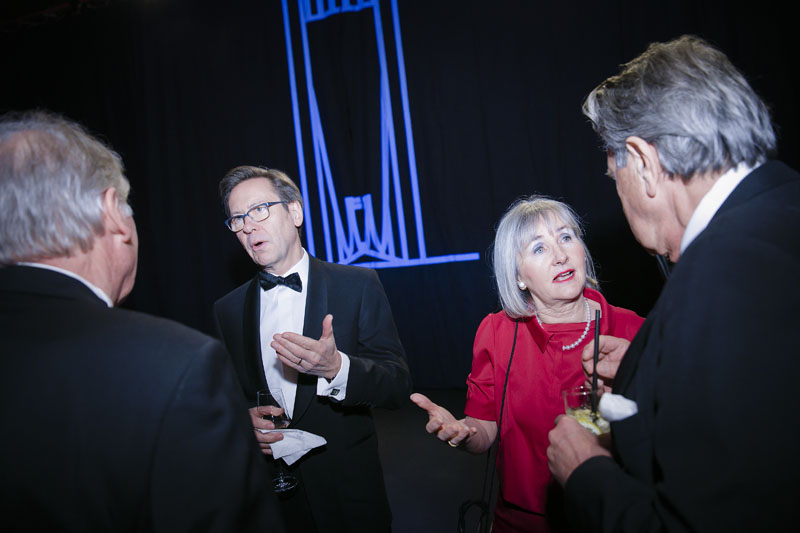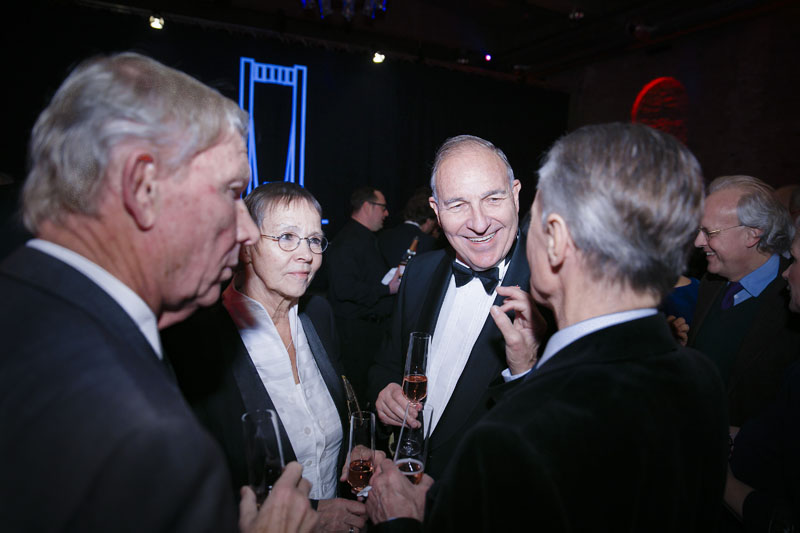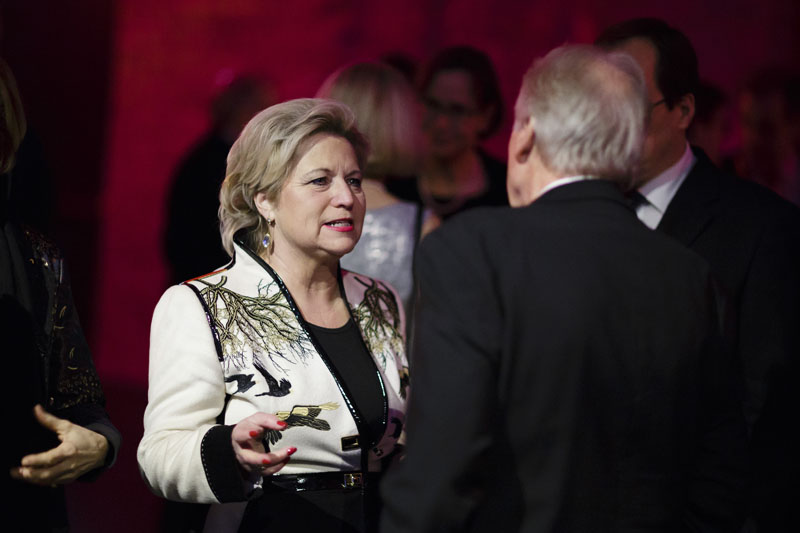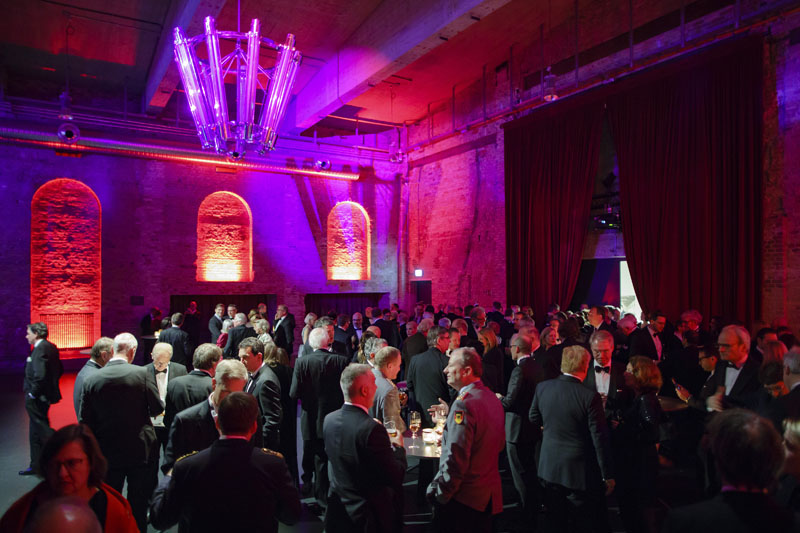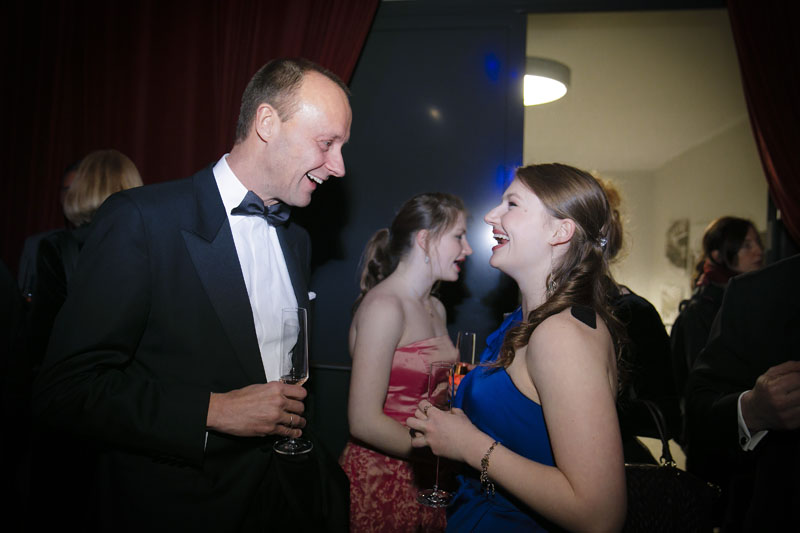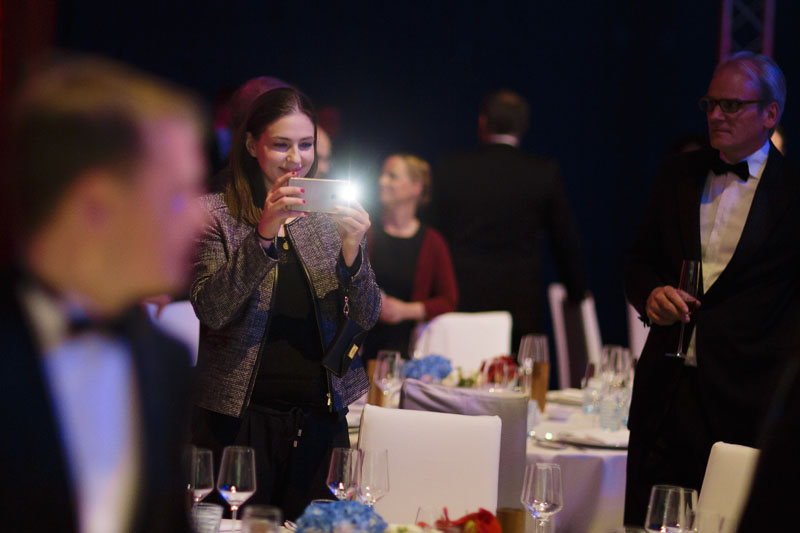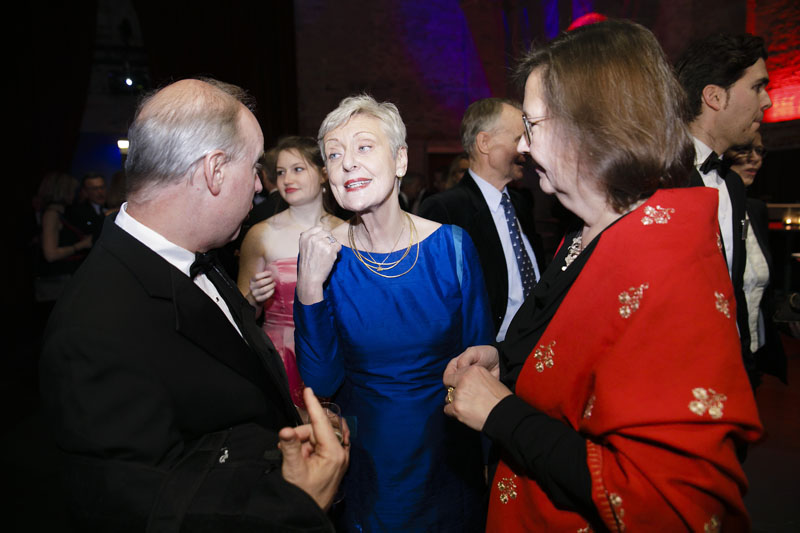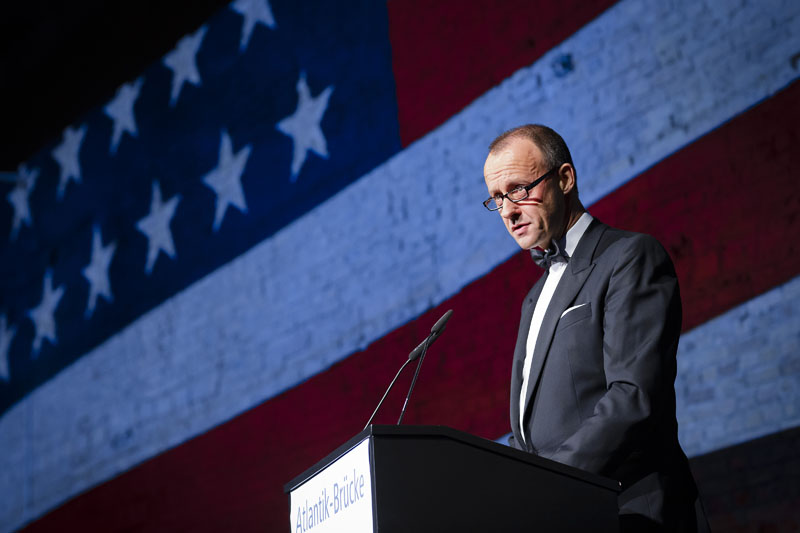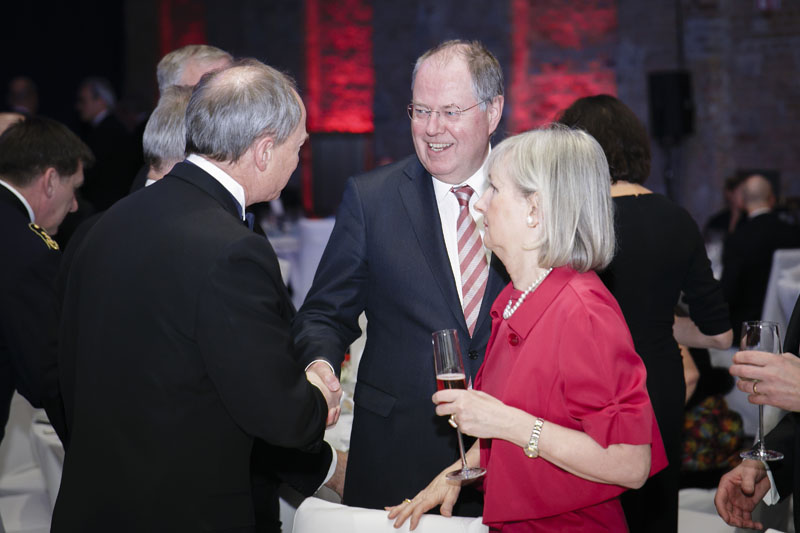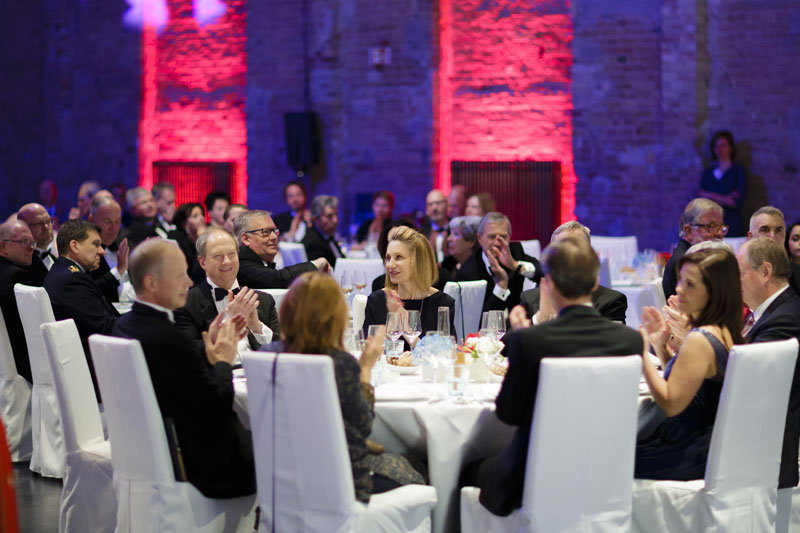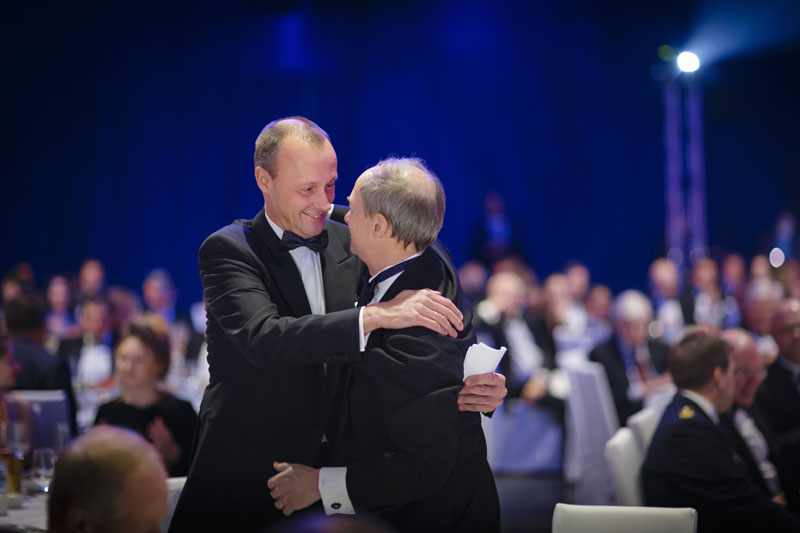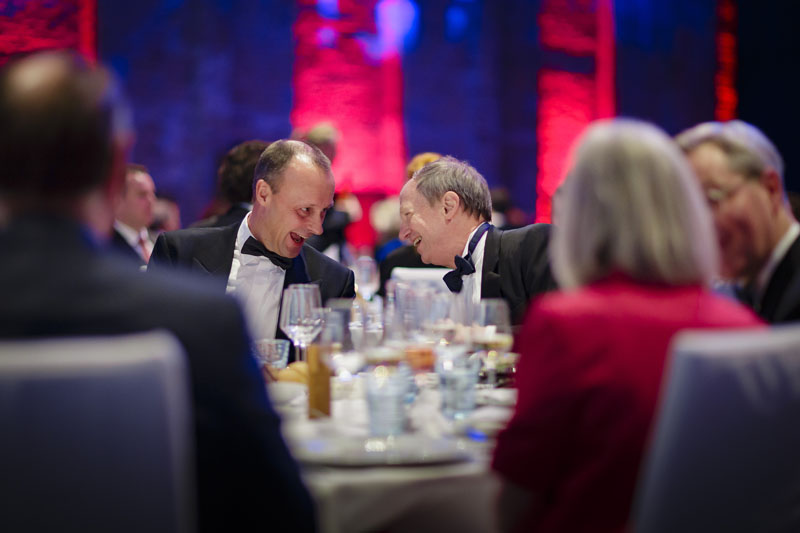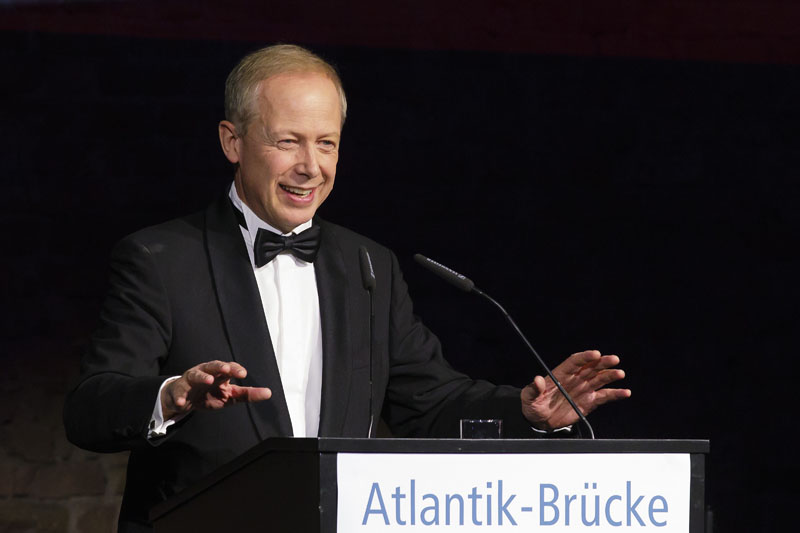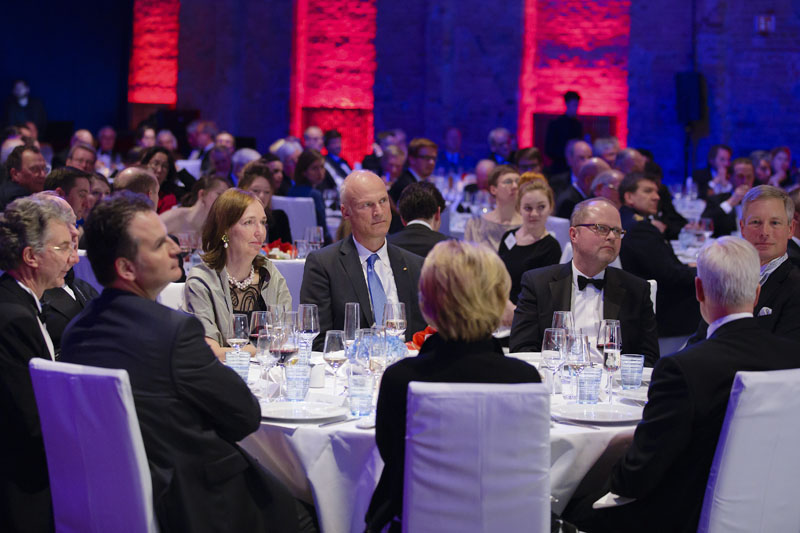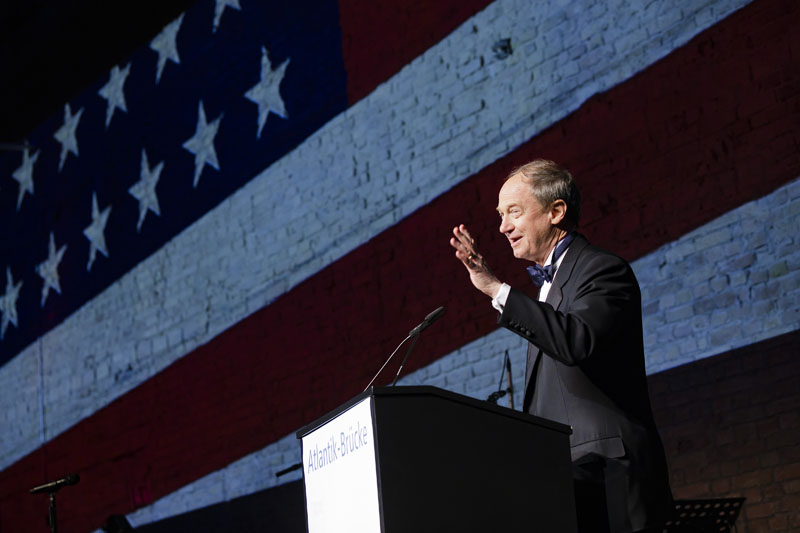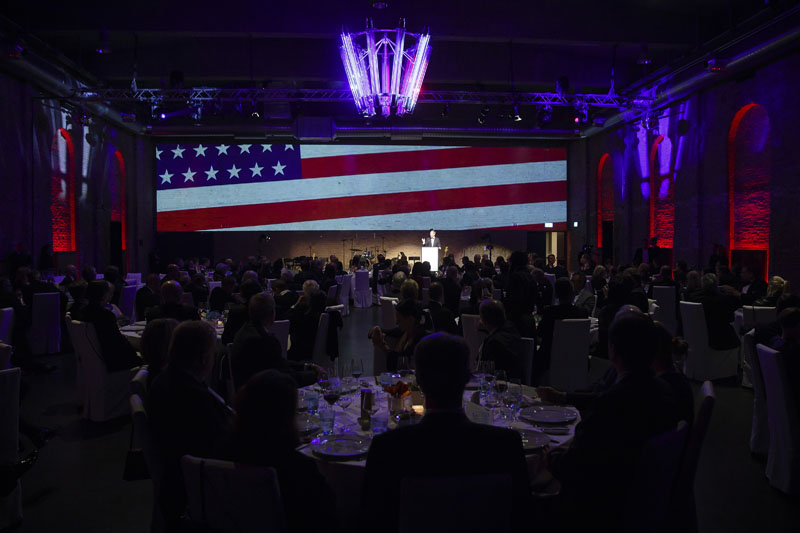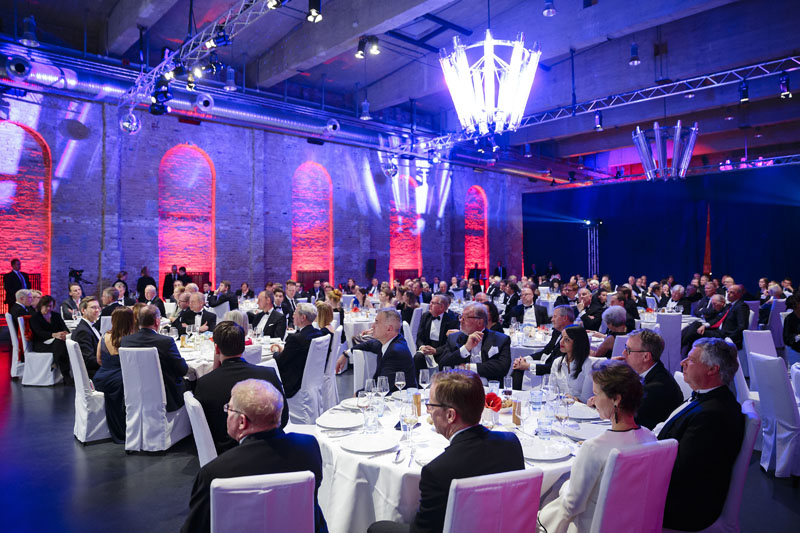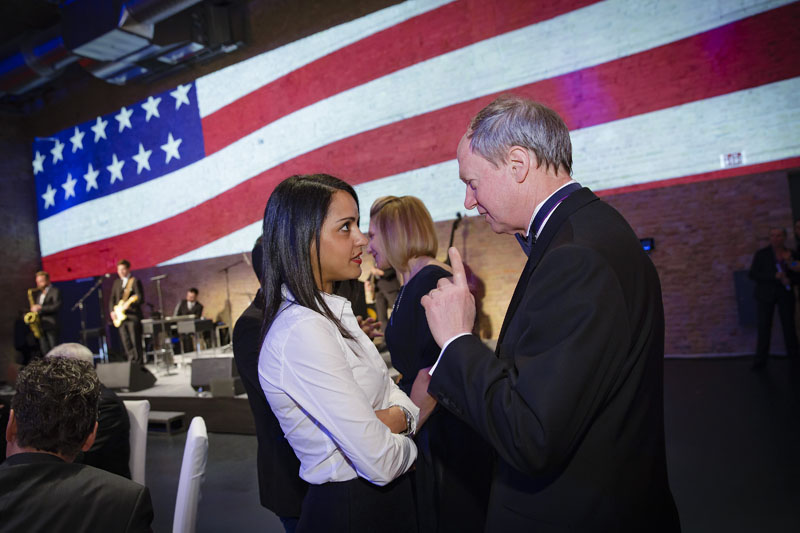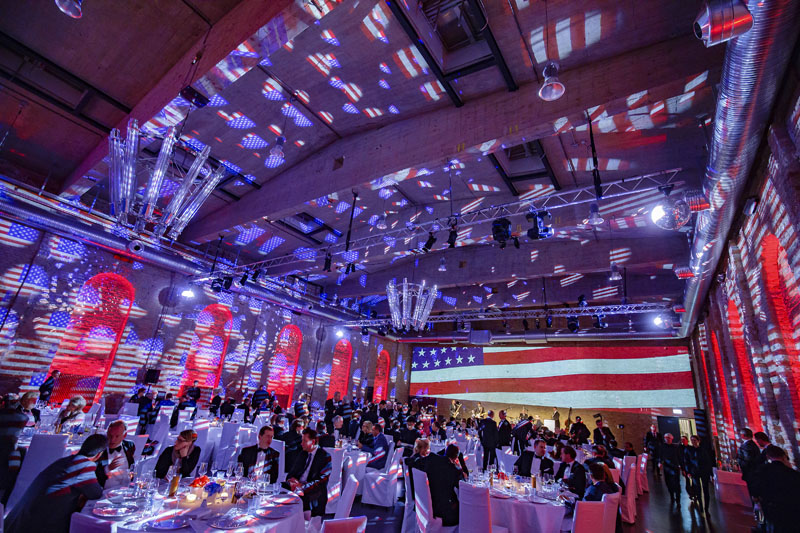„Serving as the U.S. Ambassador to Germany has been the honor of my life“
With a festive dinner, 200 members and guests bid US-Ambassador John B. Emerson farewell on January 18. The Ambassador adressed the guests with a moving farewell speech:
“Thank you, Tom Buhrow. And Friedrich, once again thank you for that warm welcome. And I say “once again” because, in addition to the many times you and I have worked together and shared podiums over the past three and a half years, you and the members of the Atlantik Brücke were the first to officially welcome the Emerson family to Berlin back in August of 2013. I remember that very vividly. And I must say, it was a little intimidating to come into that tent, filled with so many of Germany’s luminaries, waiting to take the measure of the new Ambassador. But you all made us feel so welcome, and quickly put us at ease.
We have become dear friends with so many of you who are here tonight. And in particular, I want to thank you for inviting many of my colleagues from Mission Germany, with whom I have had the honor of working.
And so, it is an understatement to say that this occasion is truly bittersweet; because in 36 hours, before the President-elect takes the oath of office, the Emerson family will board a plane and return to our home in Los Angeles. Tonight is our official farewell to you, and to the people of Germany.
On behalf of Kimberly and our entire family, I would like to thank all of you for your friendship and your support over the course of our time here. Serving as the U.S. Ambassador to Germany has been the honor of my life; and it has been an enormous privilege for each and every one of us.
Our three girls have been a significant part of our presence here in Germany. Taylor and Hayley finished high school and then took a gap year in Berlin, before beginning their freshman year at Washington University, St. Louis. During their three years in Germany, they were able to further develop their soccer and musical skills (as some of you saw last week on MorgenMagazin) – and found many new friends on the Fussballfeld, on the stage, and in their various gap year internships.
In the fall of 2013 Jackie, our oldest daughter, started her freshman year at Stanford University, just a month after I arrived as a “freshman” Ambassador. Last year she was able to do a semester abroad at Stanford’s Berlin campus, and she has spent most of her vacations here in Germany. All three girls are missing their first week back at school so they can be here for our final goodbyes; and when they heard we had purchased an apartment in Berlin, they cried tears of joy.
As a board member of Human Rights Watch, as well as proving that with the Emersons, Germany got two Ambassadors for the price of one, Kimberly became deeply engaged in Germany’s humanitarian, arts, and entrepreneurial communities. As the refugee crisis unfolded, she worked proactively to help. And Kimberly has built so many close friendships here in Germany that we could not leave without getting that apartment!
As several of you have noted tonight, our time here has been anything but uneventful. We have often worked together on many of the challenges Germany and the United States faced over the past three and a half years, most of which were not even on the radar screen when I was nominated for this job in the spring of 2013. Consider the following: the NSA disclosures; the civil war in Syria; the brutality of ISIL and the metastasizing of terrorism into Europe; the Russian incursion into Ukraine, its illegal annexation of Crimea, and NATO’s collective response to Russian aggression; the resilience of the Taliban in Afghanistan; Ebola; the Greek financial crisis; Brexit; the loud, vocal opposition to T-TIP in the one European country that will benefit most from that agreement; the demise of “safe harbor” and the damage that posed to inter-company data transfers; the threat to our governments, our economies, our societies, and our politics of increasingly sophisticated cyber-attacks by both state and non-state perpetrators; and the greatest movement of refugees through Europe since the end of the Second World War.
The extent of Germany’s engagement on these issues has been remarkable. I remember vividly my first Tag der Deutschen Einheit back in 2013, and President Gauck’s eloquent speech, in which he urged Germany to become more engaged globally. And he spoke about trust, thanking Germany’s friends and partners for their steadfast belief that one day this country would be re-united, respected worldwide for its vibrant and stable democracy, and its economic strength. This morning I was privileged to attend his farewell speech, and he built upon many of those same themes.
During the seminal and critical early post-war years, the transatlantic partnership was born out of a trust that was defined and nurtured by the members of newly-formed organizations such as the Atlantik-Brücke and the American Council on Germany. Both were designed to promote reconciliation and understanding between Germans and Americans, and to build connections so that people could not only follow, but understand, developments in both countries. Over the decades, transatlantic partners have invested heavily in this relationship, and strengthened their trust.
And to that point, let me unequivocally state that the European Project, which has long had, and continues to have, bipartisan support in the United States, is one of the great success stories of world history. When Europe and the EU prosper, so too does the United States. And if some in the incoming Administration do not understand that now, I am hopeful that in time they will.
Well, as it turned out; trust became a major theme of my Ambassadorship, and a challenge as well. As noted, tonight serves as a bookend to my introductory speech to this organization, when I acknowledged a “very large elephant in the room” – the disclosures about the NSA. And from day one, my main priority was to re-build the trust between our countries that had been so badly shaken.
At that time, cooperation between our intelligence services was seen in a very negative light. To put it bluntly, the whole concept of intelligence, and its relationship to law enforcement, was radioactive. From the beginning, I stressed the need to reform; but to do so in a way that did not jeopardize one of the fundamental responsibilities of our governments: the protection of our citizens. Well, President Obama implemented important reforms. And the tragic re-appearance of terrorists in Europe underscored that we have to take necessary steps to obtain and share information within Germany, within Europe, and between the U.S. and Europe, for the purpose of disrupting, and ultimately stopping them.
The reality is we live in an era where non-state actors and metastasized terrorist groups, having gone to school on how our intelligence services operate, thanks to highly publicized hacked and leaked information, have become very adept at using evolving technology to recruit, train, plan, and carry out their attacks.
Accordingly, it is essential that we continue working together to stay one step ahead of them. The good news, as I look back over the last three and a half years, is that we have never worked together more cooperatively or effectively than we are today.
And yet, to be sure, in today’s world there is no such thing as 100 percent security. The attack last month in the heart of a traditional Christmas market, nestled around the Gedächtniskirche, brought home to us once again the threat of violent extremism in our societies. Nevertheless, in the face of such horrific violence, it is even more important that we hold fast to our values, and not allow acts of terror to incite xenophobic resentment or subvert our way of life. I have been so moved by the manner in which Berliners came together throughout the holiday season, undeterred by this terrible tragedy, in solidarity and in strength.
Now I know that this attack, and others before it, has added to the ongoing debate regarding Germany’s decision not to turn a blind eye to the humanitarian crisis on its borders in the summer of 2015. Yes, there are likely some terrorists who came in to Germany through the refugee trail. But make no mistake: the vast majority of individuals who have been committing these terrible acts in Europe are home grown. And the idea that by somehow closing all its internal borders to those seeking refuge, Europe could eliminate acts of terrorism; or the related assumption that those bent on inflicting harm cannot otherwise find their way into Europe, is preposterous.
The course that Chancellor Merkel has charted, while difficult and challenging, is a demonstration of moral leadership, in a world where that is far too rare. It is a course that, as President Obama said in Berlin last November, gives voice to the principles that bring people together, rather than divide them; something that is very much in the long term national security interests of both of our countries.
Chancellor Merkel and Aussenminister Steinmeier describe the German-American relationship as a cornerstone of their country’s foreign policy. And from an American perspective, there are few other countries that project the same resolve, capability – and trust – on the world stage as Germany. Our partnership is indispensable. And in these complex times, a certain amount of predictability will be important as we go forward, which brings me to the topic that is, of course, on everyone’s mind: what will be the priorities of the new Administration, especially as it relates to Europe and to Germany? Let me share a few thoughts.
First, in terms of foreign policy, it is no secret that there may well be some significant differences between the incoming and outgoing presidential Administrations: attitudes about climate change, immigration, Russian aggression, the Mid-East, the Iran Nuclear Deal, and the role of multilateral institutions, to name a few.
Possible changes in our relationship with Russia have been in the news quite a bit these past few days. President Obama has always believed it is important to have a good working relationship with Russia – that is clearly in all of our interests. But having a strong relationship with another country does not preclude standing up for our values. And after the lessons of the past century, we need to send a clear message to powerful nations that the unilateral re-drawing of boundary lines of adjacent weaker countries cannot and will not be tolerated; and neither will attempts to manipulate the electoral processes of sovereign nations.
The international community needs to stand up when this happens; there need to be consequences; they cannot be allowed to simply fade away because maintaining them seems to be inconvenient, politically awkward, or because someone says something nice about you. And as we saw during last week’s Senate confirmation hearings, many members of the United States Congress strongly believe this as well.
More broadly speaking, President-elect Trump campaigned on a foreign policy platform that was much more isolationist in nature than the long held bipartisan consensus in administrations going all the way back to President Truman and the Marshall Plan; yet many of the challenges we face are not ones that America or Europe can solve on their own.
President Obama said that one of the main topics of his discussion with the President-elect, right after the election, concerned the crucial role of the United States in addressing global challenges. The fact is, good leadership on behalf of one’s own country requires engaging the world as a whole, and participating effectively in multilateral institutions. That means that the United States, Germany, the G7, the G20, and the European Union all need to maintain, and in some cases expand upon, our engagement in the transatlantic alliance and in global affairs.
I know there is some concern here on this topic. But as President Obama pointed out, once you’re in the White House, once you begin interacting with world leaders, once you have visibility to the full complexities of the challenges we face, the demands of that office tend to shape and in some cases significantly modify your thinking. And the fact that the President-elect’s designated Secretaries of Defense, State, and Intelligence are career-long internationalists is a positive sign. So we shall see.
A second topic: I am fairly certain that one of the President-elect’s priorities will be strengthening the American economy in hard-hit areas of the formerly industrial mid-West and in the rural communities of the United States. That is where he got most of his support. The question is: how he will go about accomplishing this? Through a combination of domestic infrastructure spending and global economic engagement, or through a more protectionist approach?
I think most of us here tonight believe that trade can be a key to expanding global economic prosperity. But, trade was also a red-hot focal point of the presidential campaign. I am sure you all heard that the President-elect has declared the Trans-Pacific Partnership dead – and the leadership in Congress, which was previously supportive of TPP, went along with that, failing to push for its approval during the lame duck. This is unfortunate. When you consider that China is seeking to advance its own trade agreement with countries in the region, it is clear that the U.S. may have lost an opportunity to have helped set higher standards for global trade.
Now, the domestic politics of T-TIP in the U.S. are not as difficult as those for TPP; yet it is highly unlikely that the new Administration will make this a priority either, as I said repeatedly over the past year. And, candidly, given the reluctance of many European politicians to forcefully confront the vocal opposition to T-TIP, and the embarrassment of the EU’s efforts to approve CETA, Europe will need to make clear to the United States that it wants, and can implement, a newly negotiated T-TIP – whether by that or another name.
Beyond that, I know there is some concern here over recent comments about Germany’s trade surplus with the U.S. I trust that in time the new Administration will come to understand that there is a difference between trade surpluses that are generated by low wage, low standard economies with control over their own currencies, that have erected their own protectionist barriers, and those generated by high wage, high standard economies operating on a much more level playing field, that simply make high quality goods that Americans want to buy. And by the way, BMW is on track to make more cars in Charleston, South Carolina than it does in Bavaria!
At some point, hopefully, trade negotiations of some sort will commence between the U.S. and Europe. You all know the arguments for T-TIP; and many of you have led efforts to explain its potential benefits to a skeptical public here in Germany. But clearly, when we finally do go forward, we need to do a much better job. Complain as we might about the well-funded, often truth-challenged opposition to T-TIP, we waited far too long to get the positive story out, in ways that were clear and understandable. The days when governments can go off and spend years quietly negotiating a trade agreement and then unveil it to an eagerly awaiting public are over.
With well-funded, perpetual advocacy groups, many of which depend on a bogey-man to generate their grassroots funding, and with pervasive social media allowing for the creation of silos where information and misinformation are exchanged back and forth at ever increasing volumes, the effort to explain the purposes and benefits of a trade agreement needs to begin with a well-structured, well-funded, proactive campaign, from day one.
There also needs to be greater transparency, from day one; not conducting negotiations in public, but explaining what the objectives are; what is included in the negotiations and what is not; where progress is being made and where it is not. Otherwise, as we’ve seen, a vacuum of information is created which can be filled by anxiety-ridden fears and misinformation.
And from the outset, the fact that every trade agreement will have some dislocating effects must be acknowledged. Our governments need to work just as hard at addressing the impact of that dislocation, as they do at negotiating the actual agreement.
Now, don’t get me wrong; there will always be those who oppose any trade agreement – but by taking these steps we will have a much greater likelihood of success in the future.
The third issue I would like to discuss is something I have heard from virtually everyone I have spoken to in Germany since the election, and that is the concerns so many have about the possible impact of our election on those coming up in France, Germany, and the EU this year and next.
Well, we all know what happened in the U.S.; and it wasn’t exactly how I – and many others – thought things would turn out. Of course, any time you have a very close election, there are multiple factors and events that could have swung it one way or the other. But at a fundamental level, what happened, and why?
The very complexity of our world – fueled by the rapid pace of globalization and technological change – has created a pervasive sense of unease. Increasing economic, cultural, demographic, and social changes, coupled with a polarization in government and in society that makes it harder to get things done, have significantly diminished public confidence in the political process. In the U.S. and in Europe, people on both extremes of the political spectrum are increasingly angry because they don’t think government, or any establishment institution – including the business world – is working for them.
But it’s not just a question of economic well-being. Increasingly, since the 1980s, Americans are also divided by views regarding cultural questions, such as LGBT rights, abortion, gun control, religion, climate change, race and immigration. These differences in views are most pronounced between rural and urban communities, the areas of America that coastal elites quite literally look down on as “fly over country;” and these cultural issues, which cynical political operatives exploit as “wedge issues,” have created deep emotional cleavages in our country. The opposing camps are so entrenched that rational discussion seems almost impossible. We need to get beyond that.
And polarization in society has been enhanced by the instantaneous news environment, where a 140-character tweet can capture the news cycle for an entire day; and by the tendency of social media and ideologically targeted cable news programs to create silos where people can easily isolate themselves, getting information only from sources which reflect their pre-existing points of view. People increasingly “choose their news,” and their opinions are shaped in a post-factual environment. The danger, as we have seen, is that this ‘siloization’ creates an echo chamber of misinformation and, ultimately, of anger that can be used to generate political support; or to undermine confidence in our electoral process.
This anger, and the anxiety from which it arises, contributed to the Brexit vote; to the rise of populism, both right and left, in much of Europe; and to the anti-establishment voting we saw in our Election 2016, as well as the anti-trade, anti-immigrant movements that we’re seeing on both sides of the Atlantic. So the dislocating effect of globalization must be acknowledged and addressed; so too the relationship between social media, the press, perpetrators of fake news, and our politics, especially with the European elections coming up. This might be a topic for further examination by the Atlantik Brücke.
Now, I know there is a great deal of concern in Germany over the incoming administration; but I am convinced that the significance and importance of our relationship with Germany will not diminish over the coming years. History and politics, as President Obama says, never moves in a straight line. In his words: “We zig and zag and sometimes we move in ways that some people think is forward and others think is moving back.” What’s important is that we retain our faith in democracy, and the lively, open debate that it presupposes.
Returning to the question about the next Administration’s priorities, for those who are trying to read the tea leaves for some answers, I have some words of advice. First, don’t over-react to the tweets. Pay attention to them, but don’t get distracted or spun up by them. Tweets are not policy, and often what a President says is modified substantially after it comes out of the policy making machine that is the U.S. government.
Second, it is a truism in government that people are policy. So, pay attention to the confirmation hearings, which began last week. And by the way, who is asking what questions may be as revealing about how Congress will react to proposed Administration policies, and how those policies will be shaped, as the answers themselves.
Third, listen to Friday’s Inaugural Address. This should be an aspirational statement of an incoming President’s vision, goals, and priorities; a high level road map for the next four years. Listen to what is said; what is not said; and of equal importance, the tone of how he says it.
Then, finally, look closely at the budget that is proposed by the new Administration in late February. A President’s proposed budget is an operational blueprint. Closely examine what will be spent, and what will be cut. This will show you what their priorities truly are.
Accordingly, I would urge folks here in Germany to approach the incoming administration with some patience, and with a sense of objectivity, but without hesitating to promote our shared values; and I would encourage you to emphasize how our close economic ties and trading relationship help to raise the prosperity of both countries’ citizens.
So, where do we go from here? Yes, Chancellor Merkel and President Obama have a strong personal connection. But it wasn’t always so. German-American relations go far beyond the name or political affiliation of the current President.
The basis of our close relationship is at its core the personal contact between our citizens. Our people flow across the Atlantic as writers, journalists, researchers, scientists, artists, students, business people, employees and tourists. Our two-way trade and investment opens new opportunities for synergies, new products, and innovations in technology. And strong institutions like the Atlantik Brücke and the American Academy in Berlin are dynamic platforms for German-American collaboration on issues of global importance. So we need to re-double our efforts on the people-to-people and the business-to-business fronts, especially as we enter choppy waters.
I concluded my remarks in that first speech to you three and a half years ago, by talking about the crucial importance of reaching out to young people. And those will also be my parting thoughts this evening.
One of the most indelible connections Europe and the United States share as partners is the miracle of 70 years ago when, from the ashes of global devastation and genocide, new principles were crafted and implemented for governing relations among states, and safeguarding the fundamental rights and dignity of all people.
There are entire generations of Germans and Americans, however, who did not live through the searing experiences of the second half of the 20th century. People for whom the Luftbrücke, “Ich bin ein Berliner,” “Tear down this wall,” and reunification are so much as ancient history. Our vibrant trans-Atlantic relationship is not an inherited trait; its value needs to be transmitted from one generation to the next. That’s why we in Mission Germany consistently include youth in all of our public diplomacy efforts.
During his visit to Berlin shortly after our elections, at a small lunch in the Embassy, President Obama was asked what gave him the greatest concern, and what gave him the greatest hope. On the concern side, by the way, climate change. But without hesitating, Barack Obama placed his hope in young people. He then noted, in a radio interview, that we have to do more than “celebrate or despair around presidential elections”; that we need to do more to help young people find their voices, hone their activism, and help to make a difference.
Politics can be frustrating, but as many are seeing for the first time in their lives, especially in the UK and the U.S., elections have consequences. We need to focus on how, in our day-to-day lives, in our local civic lives, in our media, in our culture, we can all be part of the solution. And that is what so much of the work of the Atlantik Brűcke is all about.
The fact is, today we find ourselves at a crossroads. Simply put: we are indeed stronger when we work together. We must seize the opportunity to shape the future, based on our values and our ideals.
And so, in closing, Kimberly and I would again like to thank all of you for your dedication to building upon the close relationship between Germany and the United States, and for your friendship. Yes, both Europe and the United States face a set of longer-run challenges. But on all of these, we have much we can learn from each other; and with pragmatism, cooperation, flexibility, creativity, and hard work, there will be much we can do together in the months and years to come.
Vielen Dank.”
Link zur Rede von Botschafter Emerson
Atlantik-Brücke: Interview mit U.S. Botschafter John B. Emerson from Atlantik Brücke on Vimeo

